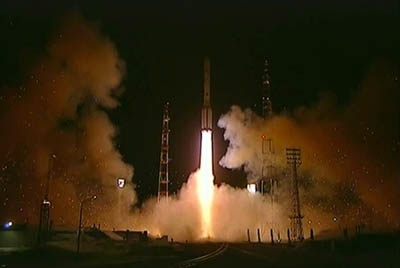Russia Investigates Failed Rocket Launch

PARIS — The Russian Space Agency, Roscosmos, has promised that there will be no "witch hunt" by the interagency commission established to investigate the Aug. 6 failure of the Proton rocket's Breeze-M upper stage and the likely loss of two telecommunications satellites.
It was the second Breeze-M failure in 12 months, and like the August 2011 anomaly it has caused the probable loss of a satellite owned by the Russian Satellite Communications Co. (RSCC) of Moscow.
In August 2011, it was the large Express AM4 satellite that was left in a useless orbit and subsequently destroyed. The Aug. 6 failure resulted in RSCC's Express-MD2 satellite being placed in the wrong orbit. RSCC said in an Aug. 8 statement that it would withhold comment on the failure until the government commission has concluded its work.
Also on board was the Telkom-3 telecommunications satellite owned by PT Telekomuniksasi (Telkom) of Indonesia. [50 Russian Rocket Launch Photos]
In an Aug. 8 statement, PT Telkom said Telkom-3 builder ISS Reshetnev of Russia is evaluating whether salvage is possible. The company said Telkom-3 is fully insured, and that the Telkom-1 and Telkom-2 satellites, which are both in operation, should enable the company to serve all its customers.
PT Telkom said that, if necessary, it will lease bandwidth from operators with neighboring satellites to meet its business requirements.
While both RSCC and PT Telkom operate as commercial entities, the launch was classed as a Russian federal mission and was not handled by International Launch Services (ILS) of Reston, Va.
Breaking space news, the latest updates on rocket launches, skywatching events and more!
ILS, which markets Proton vehicles, has a packed manifest planned for 2012, with as many as 10 flights planned. Its fifth campaign of the year occurred in July with the successful launch of the SES-5 satellite owned by fleet operator SES of Luxembourg.
Next up for ILS had been the IS-23 satellite owned by Intelsat of Washington and Luxembourg, a launch that had been scheduled for mid-August.
Other satellites that had been awaiting an ILS launch in the coming weeks include the EchoStar 16 satellite owned by EchoStar Corp. of Englewood, Colo.; the Yamal 402 satellite owned by Gazprom Space Systems of Moscow; and the Satmex 8 satellite owned by Satmex of Mexico.
The Satmex 8 launch is perhaps the most time-sensitive among the missions on the ILS manifest. Satmex 8, built by Space Systems/Loral of Palo Alto, Calif., is to replace the Satmex 5 satellite currently in orbit. Satmex 5 suffered a failure of its electric-propulsion system early in its life and has been forced to rely on its backup chemical-propulsion system.
Satmex has estimated that Satmex 5 has sufficient fuel to operate until February before it must be moved to a graveyard orbit. If Satmex 8 is not in service at the time of Satmex 5's retirement, Satmex has said, it could deal a blow to the company's still-fragile financial condition by forcing Satmex 5 customers to seek alternative bandwidth suppliers.
In its preliminary assessment of the Aug. 6 failure, Roscosmos said it appeared that the Proton rocket's three lower stages performed correctly but that the Breeze-M upper stage, which is designed to carry the satellites to their transfer orbit for drop-off, shut down after seven seconds instead of the planned 18 minutes and five seconds.
Proton's prime contractor, Khrunichev Space Center of Moscow, issued a similar statement.
In an Aug. 7 statement, ILS said that in parallel with the Russian government investigation, it will form its own failure review oversight board to review the commission's findings "in accordance with U.S. and Russian government export-control regulations."
The Roscosmos statement said Roscosmos Director Vladimir A. Popovkin had ordered the commission to focus only on the cause of the anomaly and not conduct "a witch hunt" to determine who was responsible.
The agency said that "the culpability of specific officers will be judged only after" the commission has gotten to the bottom of the problem. "The necessary personnel decisions" will be made subsequently, the statement said.
ILS and the Arianespace launch consortium of Evry, France, are the principal providers of commercial launch services to the satellite telecommunications industry, with Sea Launch AG of Switzerland now returning to full operations after bankruptcy.
Any extended grounding if either the Proton or the Arianespace Ariane 5 rocket would affect multiple commercial satellite operators' growth plans. The Ariane 5 recently completed its 50th consecutive success since 2003.
While the Proton rocket has suffered several failures in recent years, it has always returned to flight quickly. After the August 2011 failure, the vehicle was declared fit to fly just four weeks later and successfully placed a Russian data-relay satellite into geostationary orbit. An ILS commercial Proton launch, of the SES-owned QuetzSat-1 telecommunications satellite, which was fully insured, was conducted less than six weeks after the failure, also successfully.
Proton had conducted 11 successful flights since the August 2011 failure, 10 of them using the Breeze-M upper stage, before the Aug. 6 flight.
This story was provided by Space News, dedicated to covering all aspects of the space industry.

Charles Q. Choi is a contributing writer for Space.com and Live Science. He covers all things human origins and astronomy as well as physics, animals and general science topics. Charles has a Master of Arts degree from the University of Missouri-Columbia, School of Journalism and a Bachelor of Arts degree from the University of South Florida. Charles has visited every continent on Earth, drinking rancid yak butter tea in Lhasa, snorkeling with sea lions in the Galapagos and even climbing an iceberg in Antarctica. Visit him at http://www.sciwriter.us

